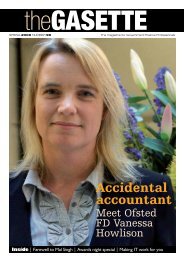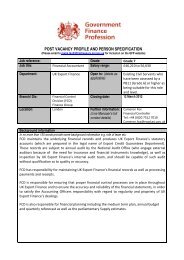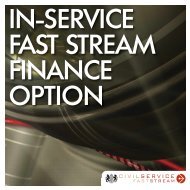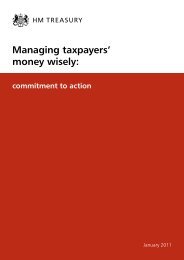Gasette This issue - Government Finance Profession - HM Treasury
Gasette This issue - Government Finance Profession - HM Treasury
Gasette This issue - Government Finance Profession - HM Treasury
You also want an ePaper? Increase the reach of your titles
YUMPU automatically turns print PDFs into web optimized ePapers that Google loves.
LeadershipLeadership at the helm ofdepartmental spendingTo manage public money wisely at a time of great austerity you needto have the right leadership skills in place, says Sumita ShahWE ARE CURRENTLY dealing with thebiggest economic crisis in living memory,which is having not just a financial but asocial and political impact. Over the pastfew years, governments around theworld have become increasingly exposedto financial reporting fraud, leaving themexposed to financial fragility and thusneeding publically funded bail-outs andincreased debt servicing costs.UK government departments arecurrently engaged in providing verychallenging and very diverseprogrammes of change. Integrity in thebusiness is all-important. The need toidentify and manage risk, achieve valuefrom information systems and manageassets and liabilities is a key ‘must’.Accountability, transparency, governanceand ethics are an important aspect ofthe key business processes within eachdepartment.Good financial management andreporting have always been central tothe effective and efficient delivery ofpublic services – at a time of reducedpublic confidence in public spending –the accountancy profession has animportant part to play in theimprovement of financial discipline andto restoring credibility to governmentfinances and taxpayers’ money. Indeed,the need for accurate, transparent andtimely financial reporting to aid decisionmaking has never been greater, at a timewhen government needs to plan for areduction in the resources available tosupport expenditure plans.Challenges facing governmentdepartments include how to implementand improve financial managementwhile managing a cost-cutting exerciseacross the board. And all this dependson the leadership skills of thosemanaging the UK’s finances.It is, perhaps, a little obvious then tosuggest that you need people withsound business and financial mind-setsand great leadership skills to identify andmanage risks, and control and shape theUK’s finances. However, given the keyrole that accountants have to play in therunning of the country’s finances, it isonly recently that the UK has hadqualified accountants leading each of itskey finance functions.With all the challenges they arefacing, are these accountants makingthe right choices? Cutting staff levels isoften seen as the easiest option, but is itthe right decision and are decisionmakersperhaps being a little hasty intheir budget cuts?The National Audit Office (NAO)reported recently that althoughdepartments have made cuts andachieved savings they were not wellplaced to make further changes as theirplanning was “not based on a strategicview”. In her report on the Whole of<strong>Government</strong> Accounts (WGA), MargaretHodge, chair of the Public AccountsCommittee, stressed that the <strong>Treasury</strong>needed to get a grip on trends in somekey areas of risk and have plans forbetter managing them. We would goone step further and say that this is trueof all government departments; after all,• Sumita Shah, TechnicalManager, Public Sector,ICAEWthey provide the figures that areconsolidated into the WGA so surely it isa responsibility of all those qualifiedfinance leaders within government.In this current environment, financialmanagement, leadership skills andcompetencies are more important thanever.LEADERSHIP AND CULTUREDoes the UK have the right leadership,culture, skills and capabilities in place totake it through these times of austerity?According to Institute of <strong>Government</strong>’sresearch on turnover of staff in the civilservice, it doesn’t.It is imperative that governmentdevelop its managers to lead. Leadershipand culture are derived from a clear tonefrom the top, starting in the boardroom.Board members should be taking a keeninterest in improving financialknowledge in current times.<strong>Finance</strong> directors need to be able tocommunicate, engage and build effectiverelationships with board members, tohelp build confidence in the ability of thefinance function to contribute to boardleveldecision-making. A strong financedirector should be able to demonstratestrong leadership and commitment toimproving financial understanding atboard level as well as within and acrossdepartments.There needs to be strong financialmanagement, integrated withperformance reporting, if government isto succeed in its policy-making, planningand delivering policy objectives. Strongfinancial management needs leadershipfrom the top. Developing staff andenhancing their skills and qualificationswill be vital to enable them to stay intune with the current mood and learn todo more with less.Find out more about leadership and skills atICAEW’s public sector conferences, in partnershipwith the NAO and in association with the<strong>Government</strong> <strong>Finance</strong> <strong>Profession</strong>www.icaew.com/psconflondon2012 andwww.icaew.com/psconfleeds2012spring 2012theGASETTE 23
















